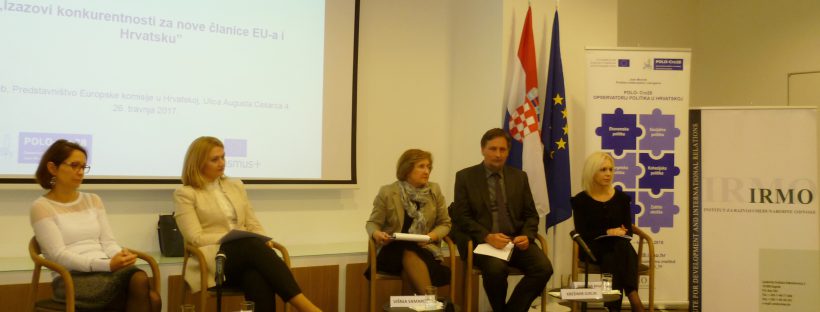Zagreb: European Commission Representation in Croatia, August Cesarec Street No. 4.
26 April 2017., 10:00-12:30 hours
Institute for Development and International Relations (IRMO) in cooperation with the European Commission Representation in Croatia organized a round table “Challenges of competitiveness for the new EU member states and Croatia”. This is the fourth round table organised within a three-year Jean Monnet project for institutional support “POLO-Cro28: Policy Observatory in Croatia” which is financed from the Erasmus+ program of the European Union and implemented by IRMO since September 2015. The round table was opened with the welcoming speeches of H.E. Branko Baričević, Head of the European Commission Representation in Croatia and Višnja Samardžija, project coordinator and the round table moderator from IRMO. The introductory part was followed by the panel discussion with the following participants: Manica Hauptman from the European Commission Representation in Croatia, Krešimir Jurlin from IRMO, Andrea August from the Agency for Investments and Competitiveness and Martinva Basarac Sercić from the Croatian Academy of Sciences and Arts.
Manica Hauptman presented mechanisms and instruments for strengthening competitiveness in the EU. She listed some of the main challenges confronting the EU in the field of competitiveness such as: support for innovations and development of technology; creating better conditions for the newly founded and growing firms as well as for those which are restarting their business activities; promotion of partnership and synergies for the creation of value chains; addressing social aspect within future industries; investing where it is most needed; and measurement of progress on the scales of competitiveness. Hauptman analysed the position of Croatia within competitiveness scoreboard of the EC competitiveness report and within the EC regional competitiveness index. She concluded that Croatia needs to improve its investment climate and strengthen its productivity because in these areas it legs behind other new EU member states in all sectors.
In his presentation Krešimir Jurlin compared the position of Croatia with those of compatible countries on the international scales of competitiveness. He indicated that in the 2007-2010 period Croatia experienced a significant fall on the international scales of competitiveness such as the ones published by the World Economic Forum or the International Institute for Management Development. Today, the macroeconomic indicators have improved, the institutions have been strengthened and the corruption is reduced. However, concerning some other areas such as efficiency of the labour market or the innovation Croatia is stagnating or even falling behind compared to previous years. According to Jurlin the principal problem with competitiveness of Croatian economy is that there is no advancement towards the economy that would be based on science and high technology.
According to Andrea August there are numerous obstacles which inhibit Croatian economy to become more competitive such as: unpredictable tax policy, longevity of the court procedures, short timeframes for adopting new regulations or the over-regulation. She noted that Croatia is not implementing sufficient number of reforms to be able to move upwards on the international scales of competitiveness. Nonetheless, she mentioned examples of recently implemented reforms which directly impact Croatia’s competitiveness like the termination of seals or starting reform of the central business register. August also indicated that adoption of the Strategy of smart specialization in 2016 allowed Croatia to become eligible for using the assets of the Operational program competitiveness and cohesion. So far Croatia used this source to launch over 100 projects which have a commercial values of some 600 million euro.
The last panellist Martina Basarac Sertić presented experiences with the adoption of smart specialization strategies in Croatia and other new EU member states. She explained that smart specialization strategies represent part of the EU’s cohesion policy targeted towards reduction of the risks between the EU regions and assuring growth in whole of the EU. It is the new generation of innovation policy which goes beyond classical concept of investing in research and technology because it starts from the notion that all countries and their regions cannot be equally efficient in all areas. Basarac indicated that in its smart specialization strategy Croatia has chosen six key areas: i) transport and mobility, ii) energy and sustainable environment, iii) security, iv) biochemistry, v) health and the quality of live and vi) food. She concluded her presentation by underlining objection of the European Commission that most EU regions are still not supportive enough towards financing risky ideas with contain significant potential for innovation.
The panel was followed by the Q&A session between speakers and the audience. The discussion touch upon various issues including development of Croatian ICT sector in the context of strengthening competitiveness. It was indicated that according to the Global Information Technology Report 2016 of the World Economic Forum Croatia is positioned on the 54th place out of 139. This means that Croatia is a medium developed country, but still below countries of Central and Eastern Europe. The Digital Economy and Society Index – DESI has also been commented. According to data for 2016 Croatia is placed on the 24th place within the EU. However, it was indicated that Croatia has registered the largest increase in the value of DESI of all EU member states and that it is placed within the group of countries which are quickly approaching the EU average.

